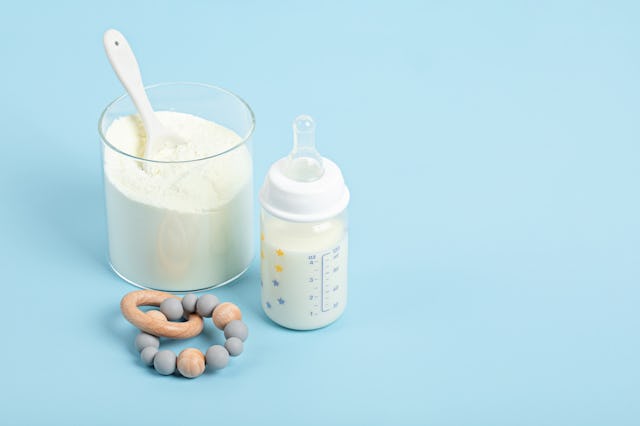Baby Formula Could Be Back In Production At Abbott Plant In Two Weeks
Abbott Nutrition has reached an agreement pending approval with the FDA that would help end the infant formula shortage.

As the infant formula shortages continue to affect families across the country, the manufacturer at the heart of the recall epidemic, Abbot Nutrition, finally reached an agreement with the U.S. Food and Health Administration (FDA) yesterday that could an end to the supply shortage in the coming weeks.
The consent decree — a legally binding agreement — will outline necessary changes and steps the company will need to take in order to address violations that were found at the Sturgis, Michigan facility earlier this year.
If the decree is approved by the court, Abbot has stated in a formal press release that they will plan to have their facilities ready for production within two weeks. They shared that they’d begin their focus on sensitive formulas such as EleCare and Alimentum and then move on to others like Similac. This would mean that formula could be back on shelves for purchase and consumption in six to eight weeks.
Robert Ford, the President and CEO of Abbot shared, "Our safety and quality processes meet even the toughest scrutiny and we're committed to continuously improving our processes and protocols."
He continued by saying, "Nutrition is fundamental to Abbott and to our goal of improving the lives of more than 3 billion people by decade's end. We intend to set the standard for the industry, raising the bar on both safety and quality."
While the Justice Department shared that it filed the decree in the Federal court on Monday, CNN says that Abbott submitted a corrective action on April 8, and has been making its own changes ahead of the filing. This included “reviewing and updating education, training and safety procedures for employees and visitors and updating protocols regarding water, cleaning and maintenance procedures at the facility.”
In a news release, Ford also shared his sentiments regarding the company’s role in the shortage, sharing, "We know millions of parents and caregivers depend on us and we're deeply sorry that our voluntary recall worsened the nationwide formula shortage. We will work hard to re-earn the trust that moms, dads, and caregivers have placed in our formulas for more than 50 years."
The recall began after a series of investigations were done from January to March that found traces of Cronobacter sakazakii bacteria in various locations inside the manufacturing plant. Upon review by the FDA, it was also revealed that Abbot had on record the same bacteria found in formula batches made in 2019 and 2020. The FDA felt that the company had not adhered to sufficient processing systems to prevent contamination, however, findings have shown that the contamination has no direct link to reported illness in infants.
A whistleblower who worked at the factory warned the FDA of unsanitary practices at the factory months before the first infant death.
“Cronobactersakazakii is naturally occurring and found nearly everywhere in the environment. Powdered infant formula manufacturers periodically detect it in their plants, and FDA, in issuing its infant formula Current Good Manufacturing Practices (cGMP) regulations, stated that, based on current technologies, it is not possible to produce a sterile powdered infant formula,” the Abbot press release states.
They continue on to state, “However, Abbott has no tolerance for Cronobactersakazakii in its production environment, and no Abbott product was distributed with Cronobactersakazakii contamination. The company is further strengthening its processes and using advanced technologies to enhance sanitization procedures, product tracking, and monitoring as well as training protocols for employees and visitors.”